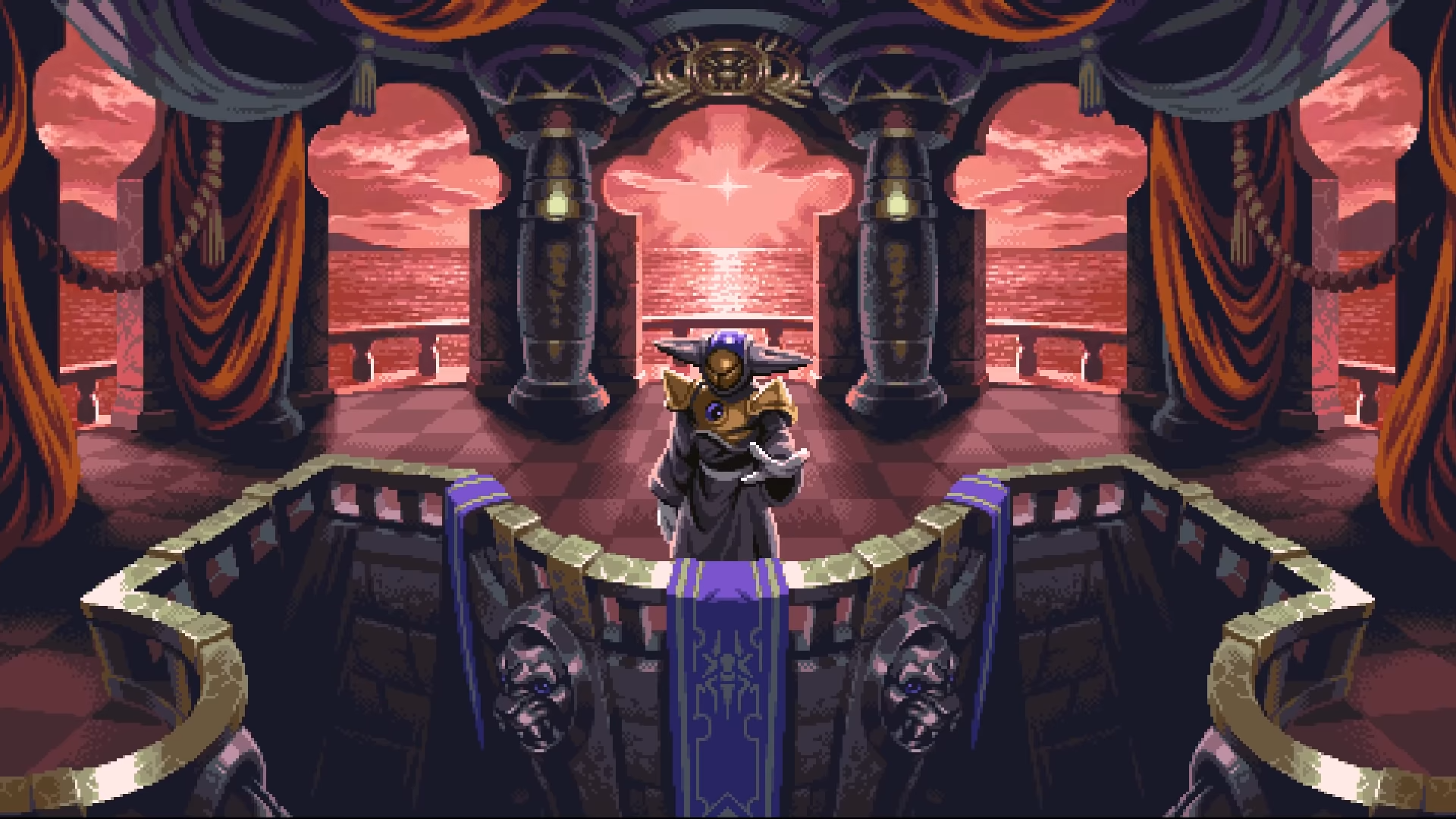'Chrono Trigger' Short Story
What follows is a story I wrote in 2014 about the classic Japanese fantasy videogame Chrono Trigger. People who enjoy this story may also be interested in Braid: More Now Than Ever, my fan-sequel to Jonathan Blow’s 2008 game containing original writing and new puzzles, or in my commentary on other games as hosted on this site, like The Witness, Braid.
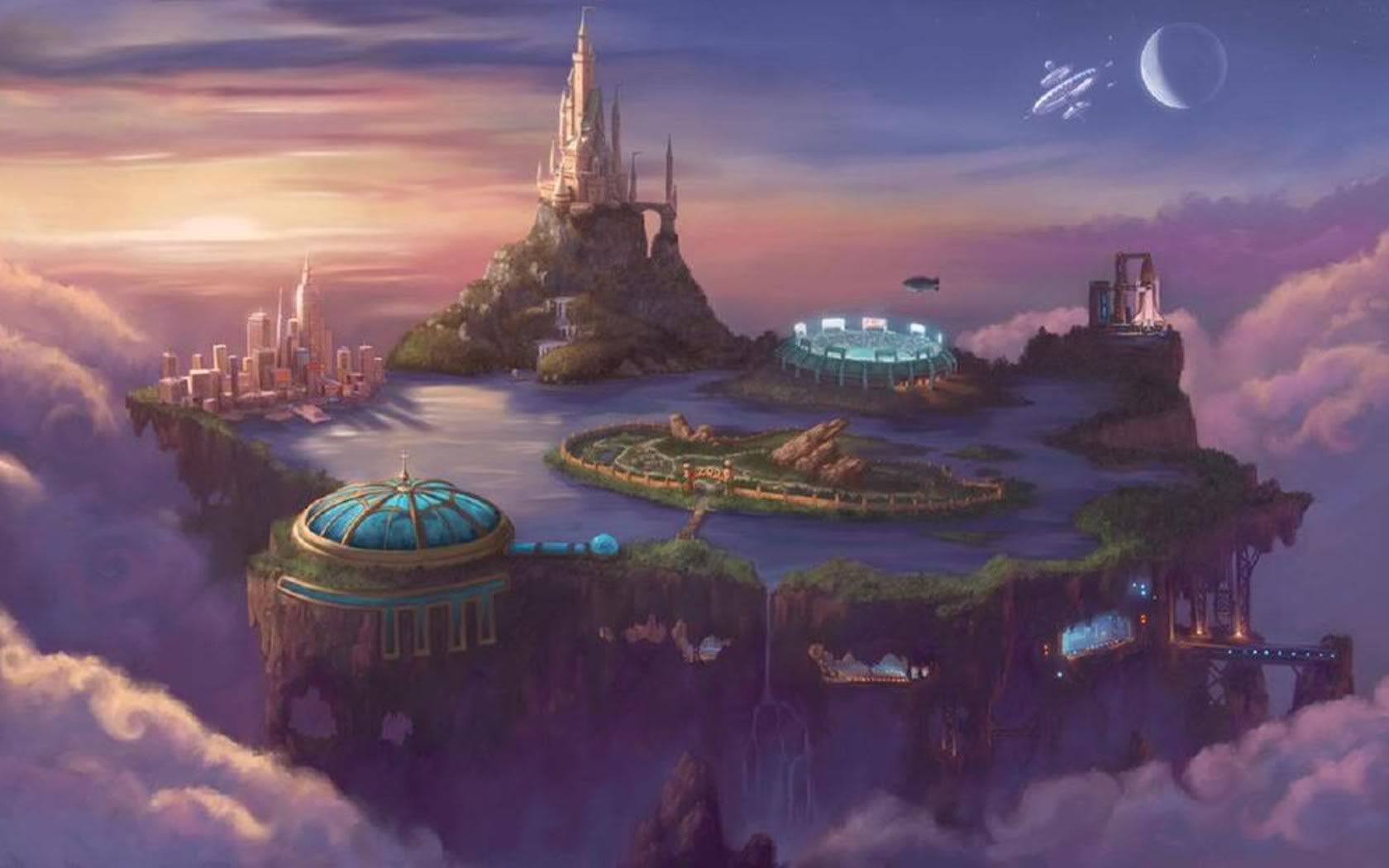
Thoughts in the mind of Crono upon his arrival at the Town of Enhasa in The Empire of Zeal, Having Been Asked The Question, “Do You Believe In Fate?”
Crono remembers having had a thought or two about this kind of thing, back when he was little, long before this whole adventure began. He remembers the ideas which, back then, might have shaped his answer. In those days, Crono had always felt a strong sense of progress. There might be small hiccups now and again, but over the long term things were bound to move forward; it was this steady march which had so clearly brought his kingdom so far in the thousand years since its founding. There was a sense of momentum, of direction to events: the present was unambiguously better than the barbarous past, and the future in turn was sure to be even more prosperous than the present. In a way, Crono supposes, that’s a powerful sense of fate.
But on the other hand… fate? As in, everything is part of some secret plan, whole nations and histories just pawns on some cosmic chessboard, events like carefully arranged dominoes, all conspiring towards a predetermined end? It’s just too absurd, it’s cartoonish. It’s so obviously contrary to the ordinary, everyday world of infinite tiny choices and considered, freely-made decisions. Maybe he could talk himself into some subtler definition of fate, but the normal one, the idea that It All Happens For A Reason, that such-and-such was Always Meant To Be… it’s myth, it’s make-believe. It’s just too silly to be true.
But that was the Crono of long ago. It’s been barely a few weeks, but it feels like it’s been forever. So much has changed: he’s seen things he’d never have even imagined, learned things that had been forgotten for millennia. And his companions, five of them now, brought together from every distant corner of the world. Each has their own long and strange story, each their own peculiar perspective. What are they thinking? What would be their answers to the question of fate?
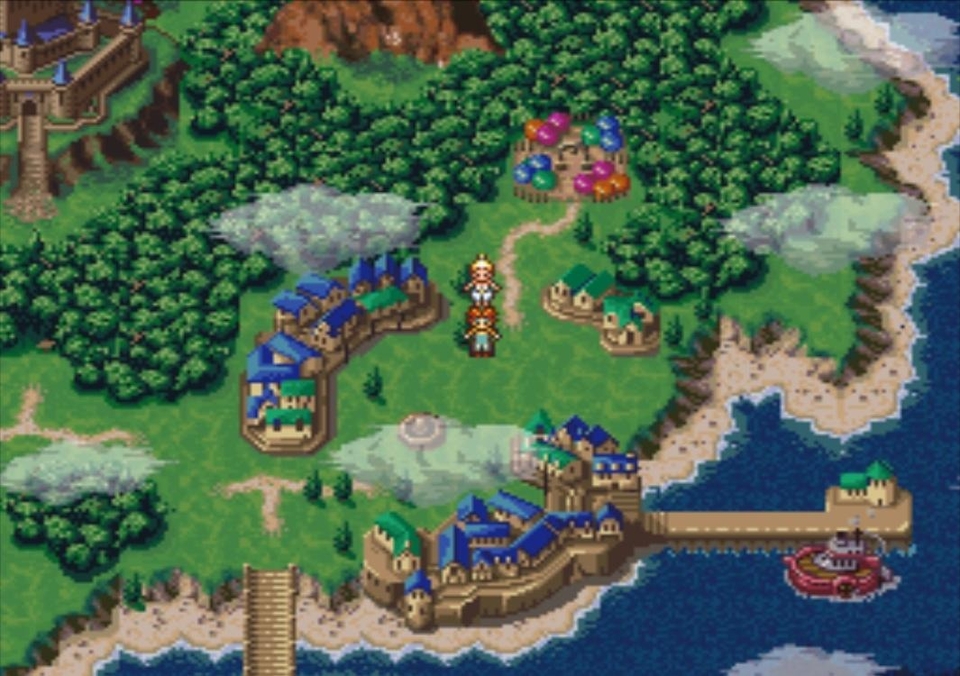
Marle started all this, at least in the sense that it was her royal pendant that caused Lucca’s machine to generate a time-gate. When it happened, it seemed totally random: Chrono bumped into a girl at the fair, then her strange necklace somehow set off the gate. That first part, at least, wasn’t what it seemed: Marle is no ordinary girl, but royalty, in line to become the twenty-eighth Queen of all Guardia! She had disguised herself and left the castle to see the fair without drawing attention, but in a sense her plan backfired: by now she and Chrono and the others have had more dealings with the Guardia royal line than he would ever have guessed possible. Before their adventure began, Marle felt estranged from her parents, her kingdom, and her role as princess. But as they’ve hopped the centuries between Guardia’s past and present, Marle has been a witness to the myriad subtle strands of cause and effect that connect her to her ancestors even thirteen generations distant. She’s seen kindness in the 6th century repaid in the 10th, a testament to how values and ideas can persist through the ages. She’s also watched how legacy can twist over time and create unexpected consequences: a criminal justice system established to prevent barbarism becomes a tool of oppression, and a newly-discovered treasure in one age becomes a white elephant that nearly bankrupts the kingdom in another.
But that all happened later. When Marle was thrown for the first time through the portal her pendant created, she was dumped into the Dark Ages. The young princess was mistaken for her distant grandmother, the fourteenth Queen Guardia – the real queen had gone missing several days ago under mysterious circumstances. Marle’s appearance was celebrated by the people: the Queen had been found, so the search was called off. But this meant that the real queen would never be found, preventing Marle from ever being born. Chrono remembers watching it happen: while he and Lucca were talking to her, she slowly began to change, flicker somehow, as erratic motions seemed to tug at different parts of her body. It wasn’t her muscles that were jittering, but somehow the world. She could feel it, each twitching tug growing more forceful, like the motion of a spinning top, unstable, about to spin out and tumble over. She screamed, and the scream too was a twitching, flickering, stretched and distorted sound, as she was finally torn out of the universe by the tidal forces of space and time.
What must this have been like? The rest of their party have seen a few changes like this, but to actually experience them – to know that you are changing, that your existence is racing around a vicious loop of causality, to know that the childhood you remember, the childhood that in this instant you really had, is somehow different from the one you had a moment ago. To feel yourself shaped by the past in an infinity of ways, to know with helpless certainty that you are only the inevitable, fated product of that succession of events. But in another sense not inevitable at all – that you are so fragile, so unstable, that surely nothing could ever be predestined, when the slightest change can throw such chaotic torques into the path of future history!
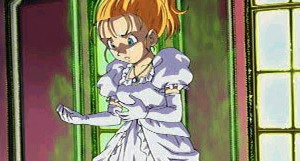
The places they’ve been to and the things they’ve seen have been new for everyone – but especially for Ayla. In her world, nothing was ever new. She lived in a tribal society, millions of years ago. Every day was the same there: the same dangers, the same opportunities, the whole world just a tiny outpost of ignorant humanity in a vast and homogenous jungle landscape. Whole centuries come and go there without much event; any history is first blurred into mumbled myth, then forgotten. Hell, if anybody had asked her about fate before all this started, she probably wouldn’t even know what they were talking about. “Fate – you mean, what do I think about all the stuff that hasn’t happened yet? Well of course it’s figured out ahead of time, dummy, ‘cuz I’ve already done the figuring: it’s gonna be just like all the stuff that’s already happened before!“
Indeed, Crono doesn’t think her opinion has even changed much in all the time since they met her. Medieval kingdoms, dystopic futures, lost atlantean empires – to Crono, each era seems dramatically different, their cultures and levels of technology diverging wildly from what he experienced in his own time. But to Ayla, everywhere they’ve gone has been so unbelievably far from anything she’s used to, the different eras might feel equally incomprehensible. Connecting past to future across that vast gulf – Crono’s not even sure if Ayla realizes that these different worlds really are all different parts of her future, rather than just different places somewhere else on the planet. She is happy to help Crono in the fight against Lavos – but more out of friendship, or in repayment for taking down Azala and the Reptites, than out of concern for her distant descendants. And why should she need to feel such concern? No matter what happens to Guardia Kingdom or the Empire of Zeal, it’s all millions of years in the future for her. When this adventure is over, and Ayla returns to Iota villiage, none of these places will have any relevance anymore. She’ll go back to living her life –and when it ends, other people will be living other lives little different from hers. And it’ll go on and on like that, for thousands and thousands and thousands of generations: the future no different from the past, each day just the same as the one that came before.
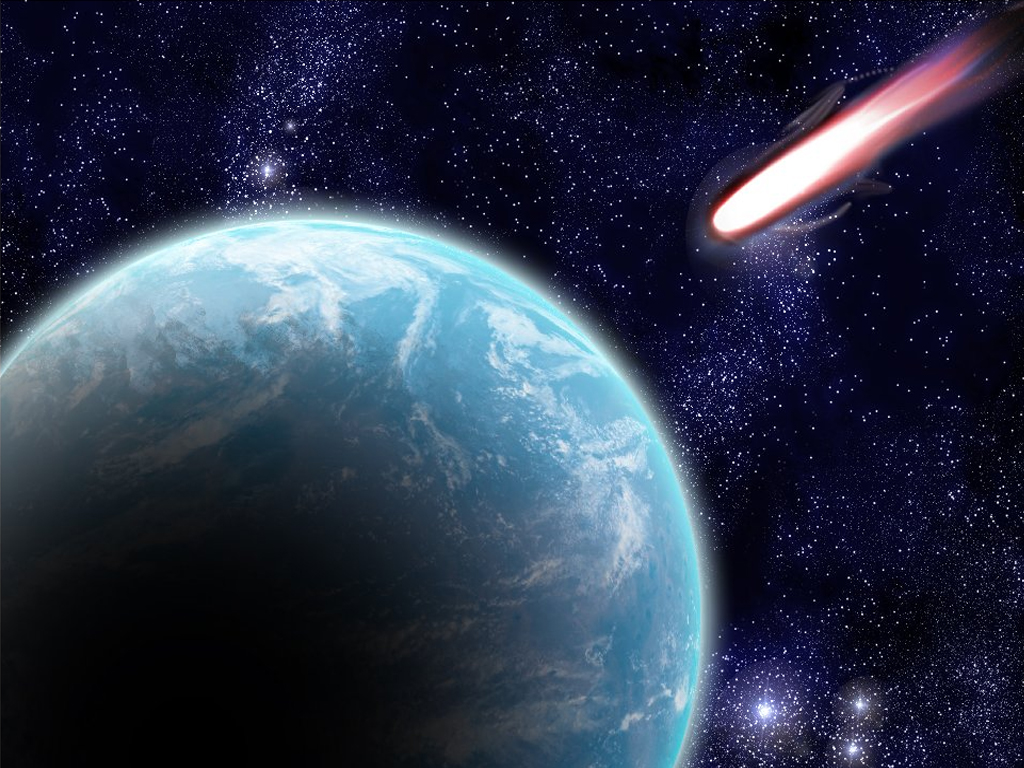
Lucca is probably the expert opinion here. She opened the first time-gate, after all, even if it was an accident while she was trying to make a teleportation device. Since then, she’s spent all her spare time working out equations, trying to figure out as much as possible about how the gates work and what all their time-travel is doing to the world. She has concluded – well, honestly, most of it is way over Crono’s head; Lucca has mostly been talking to Robo lately since he’s the only one who can keep up with all the technical stuff. But Crono remembers right before they were about to make the jump into the deep, prehistoric past. He was afraid –they had all been afraid, even if nobody said it– that whatever they did so many millions of years back, it would probably have huge effects on all future ages. Their families and friends might be totally erased, replaced by an entire alternate history. But then, when they actually did return to the present, that’s not at all what they saw. For all they had done –defeating the Reptites, finding enough Dreamstone to repair the Masamune, recruiting Ayla, and saving the whole Iota tribe– the change in the present was completely undetectable.
All of these time-hopping adventures: to Crono it feels like they occur totally outside the normal bounds of causality, a mischievous meddling in the proper order of events. But Lucca points out that if that was the case, the present should be vastly altered whenever they return from visiting a past age. Instead the differences, if they appear at all, are minor and isolated. She says that the only way this makes sense is if the seemingly original, untouched world we grew up in was actually somehow already altered by our current time-traveling actions. Those actions aren’t changing the world but rather in a sense completing it, because somehow the world has always already been changed by them. So does this mean some other version of myself has already done the things I’m doing right now? Are there an infinite number of Cronos, each fulfilling the same destiny over and over? This is where Lucca starts to roll her eyes. “I mean kind of, I guess,” she starts, “But really that’s totally not the right way to think about it. See, you’re still trying to frame things as the result of a normal process of cause-and-effect –made cyclical because of our time-travel, of course, but still decidedly temporal in the ordinary sense. Really it only makes sense to think of the universe stabilizing itself through causal resonance on some unknown extra-temporal level. All of us time-travelers necessarily exist in such a way that our actions are not only self-causing, but also self-stabilizing in the case of variance, and as for how things got this way in the first place? Well, not through any normal process of revision, but instead via some kind of instantaneous extra-temporal harmonic resonance effect. So yeah, no infinite Cronos.”
And no fate? On the one hand, unlike most people in Crono’s time, Lucca doesn’t believe that a god designed the world to follow a special plan. And despite the drama of their adventure, she definitely doesn’t believe in fated heroes, days of judgement, or destined battles between good and evil. But on the other hand, she does believe that the universe is “deterministic”: if you knew what every particle in the whole world was up to during one particular instant, you’d be able to predict their future movement and interactions perfectly, so you’d know exactly what the whole future would be like. How did the particles happen to get like that, rather than being in some other configuration? Well, Lucca says that the world went through some kind of “extra-temporal settling process” of “self-stabilizing resonance,” which means our particular history is “cradled in some low-energy configuration: at least a local, or possibly global minimum within possibility-space.” Deterministic history – that means the future’s inevitable – settled into a stabilizing minimum – that means things couldn’t have happened any other way. Lucca might not call that fate, but to Crono it at least sounds pretty similar.
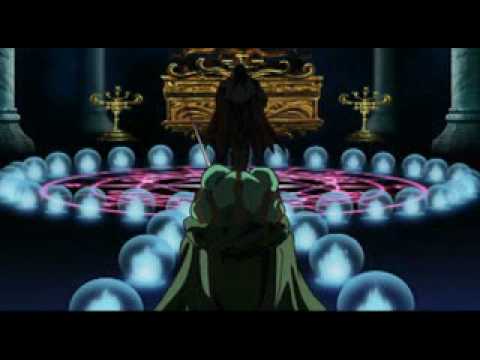
Frog… Frog is a strange one. For Crono and everyone else, their quest through history has not just been an incredible, unexpected adventure – it has also given them a big change in perspective. Crono mostly doesn’t think about this, distracted as he usually is by the drama and romance of his mission, the thrill of battle and the intrepid courage of exploration: knowing a heroic epic when he sees one, Crono is all too eager to play his part. But on those rare occasions when he does step back and consider it all… it’s like suddenly he’s way out in space, looking down at his faraway home while watching whole oceans spin by. Seeing so many lives come and go, seeing the river of history bend and meander across changing eons – it forces a certain detachment.
But Frog isn’t like that. After all this change, all this adventure, he’s still just the honorable knight, seeking only to fulfill his duty to his liege. To Crono it seems a little ridiculous – like how could you still care about all that little stuff, after how far we’ve come? You might start to suspect that Frog was clinging onto his knightly duties for dear life, the one thing grounding him to the backwards era from which he hails. Or hey, maybe he’s just stupid.
Except it’s obvious he’s not. Frog might’ve been born in the Dark Ages, but still it’s clear he’s more thoughtful than Crono and all the other humans in their party put together. Crono’s seen him: how he always volunteers to keep watch over the rest of the camp, how he takes lots of time alone just polishing his armor, sharpening the Masamune. Frog is quiet, soft-spoken, but he’s thinking in every moment. Crono can tell: when Frog has that faraway look, he’s not just reminiscing about his days back in Guardia Kingdom. No, he’s going over everything they’ve seen so far, figuring things out, putting the pieces together better than anyone.
So, from Frog’s point of view, what picture do those pieces make?
For a long time, Frog thought Magus and his shadowy forces were the ultimate evil. But in a twist, he discovered that Magus had only been doing what he felt he had to –he had raised up his army, enslaved half of Guardia, tried to dominate the globe– in a desperate bid to build his strength to summon and defeat a far greater destructive force, the monster Lavos. Stopping Magus might’ve bought Guardia some time, but it’s doomed as long as Lavos still exists. So joining Crono is really just another part of his duty to the kingdom, another chapter in a knight’s story. And it really is a story: to Crono all the fairy-tale stuff seems absurd, dark wizards raising goblin armies and lost princesses rescued by valiant knights cursed into animal form. Even though it’s real it still seems made-up, and there’s the question, really. So Frog is playing a part in an old fantasy tale, he even realizes this – surely he notices that to everyone else all the chivalry stuff looks like theatre. But is he acting by nature, or by choice? Back before Crono had pieced together the Masamune… Frog was living alone in the forest, he had lost faith in himself, he felt he was an imposter, living in Cyrus’s shadow. Cyrus was the destined hero, but he was killed, and Frog was failing in his attempts to fill that void and save the kingdom himself.
Now he’s succeeded: eventually he did take the legendary Masamune, and used it to defeat Magus in the dark tower. So now Frog feels a lot better about himself, but what does he think of fate? “Cyrus had fate, but I did not. He was fated to defeat Magus, but failed. Instead, with thine aid, I succeeded. Impossible, thou might say: if thy were the one who saved the kingdom, then thy must have been the fated hero. Yet somehow I know that is not the correct interpretation. Perhaps mine was rather to inherit a destiny that by rights belonged to him? I cannot say.“ Fated to defy fate, destined to give off the mere appearance of destiny? Or maybe there is no real destiny, yet if Frog believed in destiny it was inevitable that he would find a way to defeat Magus? Is an imposter-hero still an imposter if he has perfectly filled the role? Is it only his own attitude towards his actions that holds him back from becoming the true knight that others see in him – and if so, one must ask, can a sufficiently skilled actor hope to transform himself into the character he imitates? Crono wonders if these are some of the questions Frog has already been asking of himself, in all those quiet moments.
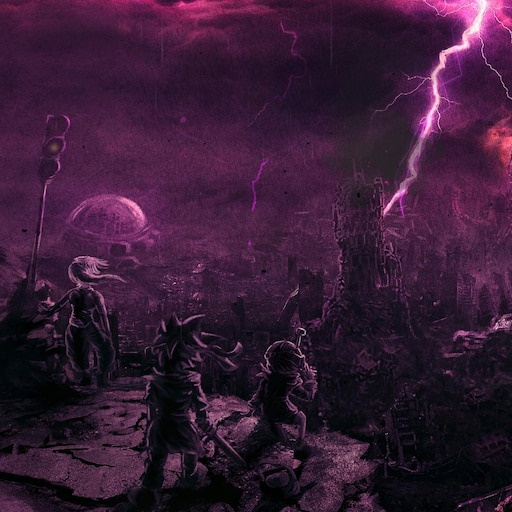
Robo’s journey has been longer and stranger than any of the others’. Created as R66-Y by the Mother Brain of Geno Dome’s automated factory, Robo was originally designed for the sole purpose of bringing Mother Brain’s electric dream into reality: the last fragments of humanity overpowered, the world remade as a robot utopia of logic and steel. Then as now, Robo’s decisions were made freely by his own mind, acted out by his own will. But what does it mean to be free, if your very mind was moulded by another’s hand?
To live with a pre-programmed mind sounds horrid to Crono – until he considers his own circumstances. His parents, his friends, the culture and country and class and era of his birth, beyond that the impact of heredity and evolution, a chain of cause and effect stretching back millions of years, all the way back to Ayla, and beyond! At least Robo could hope to list the forces that had a hand in his genesis; Crono would never have a chance to fully comprehend the myriad influences on his identity.
But Robo’s premeditated destiny was not to be fulfilled – he broke down in Proto Dome, and lay there inert for decades until Lucca repaired and reprogrammed him. Since then he’s been living and adventuring with Crono, Lucca, and the rest. He’s made friends with everyone, and – though he joined their party merely out of gratitude for Lucca’s repair work – Robo is now as dedicated as anyone to stopping Lavos and saving humanity. Crono assumed that he was watching a change of heart – but was it really just a change of circuitry? Think back to when they visited Geno Dome: the other automatons called him defective, they said that his mind had been subverted, that he had forgotten his true purpose. Robo opposed them: he said he had not been subverted, but had merely traveled and seen farther than they – that it was new data, not new programming, which was responsible for his new behavior.
Why is the one respected, the other despised? It’s wonderful to “change one’s mind” after some new experience or re-consideration… but to be changed? To alter the very method of one’s thinking and not merely the content of one’s beliefs? That’s a different matter – indeed, it might even be a different person. In Robo, Crono can’t help thinking that a change caused by new data is somehow more real, more genuine, more earned, than a change caused by new programming. But in fellow humans, it’s different: to have a “transformative experience,” to be a “changed man,” for humans the deepest and most meaningful changes are closer to changes in programming. To alter opinion and behavior based only on new data is weak, shallow – mere flip-flopping.
And were Robo’s words even true that day? Crono knows that he had been reprogrammed, modified at least slightly. During her repairs, Lucca removed Mother Brain’s instructions, she said: that way, Robo would not harm us. When she did that, was she restoring Robo’s true self, reversing the pathology that Mother Brain had injected into the robots coming off her assembly lines? But the robots at Geno Dome weren’t mindless or insane – they were perfectly rational beings, albeit with some built-in predisposition towards a radical ideology. By what metric do we judge Robo’s mind superior to those of Mother’s minions? Perhaps it is impossible to speak of a “true self”; could it be that the thought of “repairing” a personality is, fundamentally, an absurdity?
When they confronted Mother Brain – her menacing, holographic image flickered and sheared across the monitors like reflections in a shattered mirror – she claimed to reveal Robo’s secret, his special mission. She said he was a custom design, programmed to live like a spy among the humans and attempt to befriend them, the better to record and analyze their strengths and weaknesses, to understand the way they think.
Was she telling the truth? There’s every chance that Mother’s programming ran far deeper and more subtle than what Lucca thought she saw. But if Mother Brain’s programming survives inside Robo, then what Robo had seen of the outside world really was able to change him, because he opposed her boldly and without hesitation.
Or was it really just a desperate lie, an attempt to sow suspicion among their party and win Robo back to her side? If so, the ploy failed to save her – but it did not fail to demonstrate that she had developed a keen understanding of human psychology. For a long time after Geno Dome, Crono had watched Robo very closely. He had wanted to trust Robo, he knew that he had changed – but somewhere in the back of his mind, Crono couldn’t shake off the suspicion. For days after her death, thanks to those comments, Mother Brain had ruled a part of Chrono’s thoughts, making him fear that she might also be ruling a part of Robo’s. Maybe that’s the secret: for her, reprogramming wasn’t even necessary to gain control. Understand the program well enough, feed it the right data, and you can control the outputs without ever influencing its internal operations. Maybe that’s what fate really looks like, when you see it up close.
And to defy fate? Control the inputs, perhaps, to achieve the outputs you desire. But of course, those desires are merely the outputs of past cycles. In that case, iterate: take the old outputs and use them as inputs for the next cycle. You’ll certainly go somewhere, but how do you know if you started in the right place, and how do you tell when you’re headed in the right direction?
Ask Robo – he’s put in more cycles than anyone. Growing up, Crono had often heard the legend about Fiona, the woman who died in the middle ages trying to protect the forest near her home from Magus’s armies. After we had traveled to that time, stopped Magus, and actually met Fiona, Robo volunteered to stay behind and help her cultivate the fledgling woods. Crono left him there, and zipped forward to 1000 AD – in total, only a few hours for Crono and the other humans, but four hundred years for their mechanical friend. Working day after day, living alone like a hermit, in those many lifetimes he had turned the entire southern desert into a lush expanse of woodlands. They found his broken-down body preserved in a cathedral, venerated as a holy relic by those who came to celebrate the forest. When Lucca had finished rebuilding him for the second time, he told them his story – the things he had learned, the paths he had walked in his wandering thoughts, as the eons slipped by. He told of how, in his million hours of lonesome thought, many seemingly complicated things revealing themselves as simple and clear; other, seemingly simple things unfold into complex uncertainties. And he spoke of a puzzle which he had turned over in his mind for all those years.
It is possible to generate time-gates artificially, but apart from the one first spawned by Lucca’s experiment at the fair, all the gates they have encountered appear to have generated spontaneously and randomly, as if by some natural process. And yet, many of these gates link to moments of extreme significance in the history of civilization, of Lavos, and of the planet as a whole. Robo says that over the eons, he has sensed the presence of what he called “an Entity,” a conscious influence that may be using the gates, perhaps using even this very adventure, as a way of coming into being, of experiencing or re-experiencing the critical moments of its own existence – like how a dying man might see a vision of his life just before his death. The nature of this Entity, if it even exists, is a total mystery. But if a conscious force is alive and at work in the world in this way – if there is some invisible world-spirit guiding them, leading them on this tour through time, preparing them for their inevitable confrontation with Lavos – then Fate is surely the only word we could use to describe it.
But on the other hand, here’s Robo: an electronic automaton from the far future, designed originally by man, modified and manufactured to be a soldier for Mother Brain’s utopia, broken down for decades far from home, repaired and reprogrammed by Lucca to join an incredible adventure across thousands of years, finally a lonesome forest guardian, lost in thought for centuries, revered as a saint from a long-ago age… who would deny that such a being has transcended anything that fate might’ve had in mind?
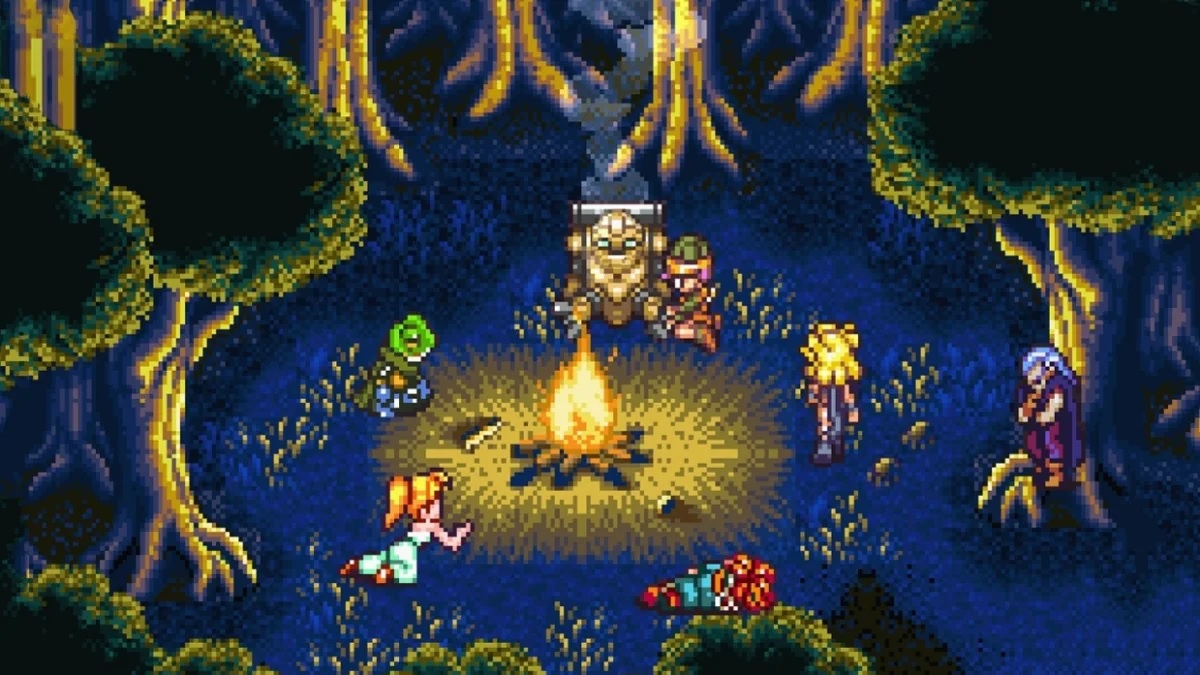
Crono ponders all these things as he considers his answer. It’s strange how important it feels to get this one right: this single conversation, not even a conversation – barely even a sentence! A yes or a no, lost in the whirlwind of history, the epic sweep of their grand adventure. A single uncertain note, set adrift in the dream-land empire of Zeal.
But Crono knows how small movements can have lasting, meaningful effects later on. Time can be a lever, magnifying the force of your actions with a fulcrum of centuries. Consequences percolate down the ages, building momentum across great valleys of time, shaping the world in powerful but often unexpected ways. Are these avalanches an artifact of intention, or an expression of destiny?
His own story has certainly snowballed. It didn’t start with a grand initiation or kingly assignment, only a trip to the fair. Then he was helping Lucca, then they were rescuing Marle, then they were stopping Magus, then tracking down and trying to put an end to Lavos.
Crono didn’t inherit the role of hero, but like Frog, he has taken it on himself. Doe this mean defeating Lavos is his destiny? Just because he has lead the charge on a heroic quest doesn’t mean his actions were meant-to-be. After all, how can something be fate if you’re doing it of your own volition? Chrono chose this path freely, every step of the way.
But did he really? Robo made a choice to turn against his creator, Mother Brain, and help to redeem humanity rather than destroy it. But Robo’s thoughts are pure clockwork, bound by a program forged by Mother Brain and modified by Lucca. And if Lucca’s right about the whole universe being deterministic, that means his own mind is really no different from Robo’s.
Throughout these eons, Crono has been taunted by the sight of the same tragic scenes repeating over and over: people just keep making the same predictable choices, basic human tendencies keep asserting themselves. Empires rising and falling, a parade of blind tyrants making the same mistakes over and over, trying to take advantage of a dark power they could never comprehend. Like Crono, these despots might see themselves choosing freely every step of the way. But from the outside it all seems so inevitable, so mindless.
Amid these cycles of destruction, Chrono finds it hard to conceive of any intervention that could meaningfully disrupt –or escape!– these devastating rhythms, rather than merely warping the timbre of individual details.
Why do we fall into this trap? How did Lavos become the resonant frequency of civilization? If these people could see the whole sweep of things, Chrono imagines, could see how many had gone before and how many would go after, then maybe they’d change, maybe they’d be able to stop. So maybe one kind of fate is just lack of knowledge – these tyrants, they’re fated to their foolish actions only because they can’t see far enough to understand the consequences. And maybe if you can see the consequences, then you can choose more wisely, and defy your fate.
Is that what Magus was trying to do? Crono will never forget the image of that great wizard, standing alone in the darkness at the top of the world.
Crono knows he sees farther than the tyrants. But can he ever see far enough to change his own destiny? Lucca would remind him that his adventures through time provide no special advantage here: he can peek forward only to the dystopic, devastated future that will occur if he doesn’t try to prevent the apocalypse – it gives no indication of whether he will be successful if he does. (Or maybe, if Lucca’s always-already-altered theory is correct, then it does give indication – that they’ve already failed. Lucca says it’s complicated: some things, even big things like the new forest, can change, while others –like Marle’s identity as Princess of Guardia– cannot.)
He remembers Robo’s ideas about the Entity. Compared to that Entity, he surely knows nothing. He might be travelling through time, but he’ll never have the whole picture, and he doesn’t have any special insight into the ultimate outcomes of his own actions. He can try to make things better for the people of Guardia, and maybe too for the people of Arris Dome, but who can guess what happens a million years from now? It’s as unknowable to him as his time is to a member of Ayla’s village.
As thoughts rush through his mind, he feels like Marle must have felt, in that moment back in Guardia castle. He’s not just torn between a yes or a no. Rather, somehow it seems his whole identity is in flux, that he as a person has become undefined, unbounded. Like that same seed of hope over and over, a tiny seedling growing into an endless forest, so this simple binary question has somehow spawned innumerable forces pulling him in every direction. These forces are not pointing only towards all the different actions he might take: they are pointing to all the different people he might be. He’s so conflicted, utterly confused…
Until he suddenly notices that he actually isn’t. In fact, the answer is startlingly clear, perfectly so. And what’s more, Crono realizes that for as long as he could remember, he had always felt this way: somehow, he just hadn’t noticed it until this very moment.
Crono opens his eyes, and looks up. His friends, standing nearby, are all watching him. After so much thought, Crono feels fresh and confident. He turns toward the small, strange creature who had asked him if he believed in fate. He opens his mouth to speak.
